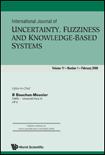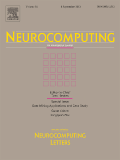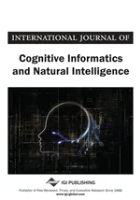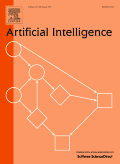
Intelligenza Artificiale
Scope & Guideline
Transforming Theoretical Concepts into Practical Applications
Introduction
Aims and Scopes
- Artificial Intelligence Methodologies:
The journal covers a wide range of AI methodologies, including machine learning, neural networks, and symbolic reasoning, emphasizing both theoretical advancements and practical implementations. - Human-Centric AI Applications:
There is a strong focus on the integration of AI in human-centered applications such as healthcare, education, and social care, highlighting the importance of user experience and ethical considerations. - Interdisciplinary Research:
The journal encourages interdisciplinary research that combines AI with other fields such as psychology, sociology, and engineering, fostering collaboration and innovation. - Robustness and Safety in AI Systems:
Research on the robustness, safety, and ethical implications of AI systems is a core area, as the journal seeks to address challenges related to AI deployment in real-world scenarios. - Knowledge Representation and Reasoning:
The journal emphasizes research on knowledge representation, reasoning, and explainability in AI systems, aiming to improve transparency and interpretability.
Trending and Emerging
- AI in Healthcare and Social Care:
There is a marked increase in research exploring the application of AI in healthcare and social care settings, focusing on supporting caregivers and addressing multidimensional poverty among older adults. - Explainable AI and Knowledge Extraction:
Emerging themes in explainable AI and symbolic knowledge extraction are gaining traction, as researchers seek to demystify black-box models and enhance the interpretability of AI systems. - AI for Education:
The integration of AI in educational settings, particularly in assessing and providing feedback, is a growing area of interest, aiming to improve learning outcomes through intelligent systems. - Human-Agent Interaction:
Research on empathetic human-agent interaction and symbiotic AI approaches is trending, highlighting the importance of emotional intelligence and user-centered design in AI systems. - Sustainability and AI:
There is an increasing focus on the role of AI in promoting sustainability, particularly in areas such as environmental monitoring and resource management, reflecting a broader societal emphasis on sustainable practices.
Declining or Waning
- Traditional Rule-Based Systems:
Research on traditional rule-based systems has diminished, as the focus has shifted towards more dynamic and learning-based approaches, such as machine learning and deep learning. - Narrow AI Applications:
There is a noticeable decline in papers focusing on narrow AI applications, as the field increasingly emphasizes generalizability and adaptability of AI systems across multiple contexts. - Basic Algorithm Development:
The journal has seen fewer publications on basic algorithm development, suggesting a shift towards applied research that showcases the integration of advanced algorithms in real-world scenarios. - Single-Domain AI Solutions:
Research focused on AI solutions tailored for single domains has decreased, reflecting a trend towards more interdisciplinary and cross-domain applications.
Similar Journals

International Journal of Fuzzy Logic and Intelligent Systems
Unveiling the Future of Fuzzy Logic ApplicationsInternational Journal of Fuzzy Logic and Intelligent Systems, ISSN: 1598-2645, is a prestigious journal published by the Korean Institute of Intelligent Systems, dedicated to advancing the fields of Artificial Intelligence, Computational Theory and Mathematics, Computer Science Applications, Logic, and Signal Processing. Established to foster interdisciplinary research, this journal has quickly established its reputation, reaching a respectable Q3 quartile ranking across multiple categories in 2023. It serves as a vital resource for researchers, professionals, and students, offering insights into cutting-edge methodologies and innovative applications of fuzzy logic and intelligent systems. With a focus on disseminating high-quality research, the journal attracts contributions that drive the evolution of intelligent technologies and their practical implications. Published from South Korea, the journal is positioned to impact the global community, facilitating a deeper understanding of intelligent systems in various domains.

INTERNATIONAL JOURNAL OF UNCERTAINTY FUZZINESS AND KNOWLEDGE-BASED SYSTEMS
Empowering research through the lens of uncertainty and fuzziness.Welcome to the INTERNATIONAL JOURNAL OF UNCERTAINTY FUZZINESS AND KNOWLEDGE-BASED SYSTEMS, a prestigious publication dedicated to advancing the fields of artificial intelligence, control systems engineering, information systems, and software research. Published by WORLD SCIENTIFIC PUBL CO PTE LTD in Singapore, this journal serves as a vital forum for the dissemination of innovative theories, methodologies, and applications rooted in the coexistence of uncertainty and fuzziness within knowledge-based systems. With its ISSN 0218-4885 and E-ISSN 1793-6411, the journal consistently ranks in the Q3 category across various Scopus categories, including Control and Systems Engineering and Information Systems, reflecting its influential position in the academic community. Researchers and practitioners alike will find valuable insights and the latest trends through its comprehensive articles, making this journal an essential resource for those seeking to navigate the complexities of this evolving field.

AI, published by MDPI, is a distinguished open access journal dedicated to advancing the field of artificial intelligence. Since its inception in 2020, the journal has swiftly established itself as a prominent platform for scholarly research, currently ranking in the Q2 category for 2023 within the artificial intelligence sector according to Scopus. With an impressive global reach from its base in Basel, Switzerland, the journal aims to foster innovation and collaboration among researchers, professionals, and students alike, providing a forum to share groundbreaking findings and applications in AI. The journal's commitment to accessibility ensures that research is available to a wide audience, enhancing knowledge dissemination and contributing significantly to the ongoing evolution of artificial intelligence technologies. To explore the latest in AI research, readers can access articles through their open access model, encouraging an inclusive academic environment.

NEUROCOMPUTING
Transforming Insights into Intelligent SolutionsNEUROCOMPUTING is a premier academic journal published by ELSEVIER, specializing in the interdisciplinary fields of Artificial Intelligence, Cognitive Neuroscience, and Computer Science Applications. With an impressive impact factor and a Q1 ranking in its relevant categories for 2023, NEUROCOMPUTING is recognized as a leader in fostering innovative research and providing a platform for ground-breaking studies. The journal’s scope covers the convergence of neural computation and artificial intelligence, making it essential reading for researchers and professionals seeking to explore the latest advancements and applications in these dynamic fields. For those interested in the cutting-edge intersection of neuroscience and computational techniques, NEUROCOMPUTING offers a wealth of knowledge that significantly contributes to both theoretical and practical advancements. The journal is dedicated to publishing high-quality, peer-reviewed articles and is an invaluable resource for students and established scholars alike, looking to stay at the forefront of research trends.

International Journal of Cognitive Informatics and Natural Intelligence
Exploring the Nexus of Mind and MachineThe International Journal of Cognitive Informatics and Natural Intelligence, published by IGI Global, is an essential resource for researchers and professionals exploring the intersections of cognitive informatics, artificial intelligence, and human-computer interaction. Since its establishment in 2007, this journal has focused on advancing the understanding of cognitive systems and their applications in natural intelligence, contributing significantly to the fields of software engineering and interface design. Operating out of the United States, the journal aims to disseminate high-quality research and innovative methodologies to foster interdisciplinary collaboration. Despite its current standing in Q4 quartiles for the fields of Artificial Intelligence, Human-Computer Interaction, and Software, it serves as a vital platform for emerging scholars and seasoned professionals alike seeking to explore new frontiers in cognitive technologies. While it does not provide direct open access, these publications are instrumental in shaping academic discourse, and contribute to ongoing advancements in how we understand and integrate cognitive science into practical applications.

IEEE Computational Intelligence Magazine
Advancing Knowledge in AI and Theoretical Computer ScienceIEEE Computational Intelligence Magazine, published by the esteemed IEEE-INST ELECTRICAL ELECTRONICS ENGINEERS INC, is an essential resource for researchers and professionals in the fields of Artificial Intelligence and Theoretical Computer Science. With a robust Q1 ranking in both categories for 2023, this magazine stands out as a leader in disseminating cutting-edge research and innovative applications within computational intelligence. As an invaluable conduit for knowledge, it covers a diverse range of topics, including but not limited to machine learning, neural networks, and data mining. The magazine is particularly recognized for its interdisciplinary approach, bridging gaps between theory and application while contributing to advancements in technology and society. Although it does not offer open access, the insights provided are critical for staying at the forefront of this rapidly evolving discipline. Join a community of like-minded scholars and practitioners by exploring the latest findings and trends published from 2006 to 2024, operating from its headquarters at 445 Hoes Lane, Piscataway, NJ, United States.

Machine Intelligence Research
Elevating the Standards of Machine Intelligence ResearchMachine Intelligence Research is a premier academic journal published by SPRINGERNATURE, dedicated to advancing knowledge in the rapidly evolving fields of Artificial Intelligence, Applied Mathematics, and more. With its ISSN 2731-538X and E-ISSN 2731-5398, the journal is recognized for its impact, holding a distinguished position in various Q1 categories for 2023, including Computer Vision and Pattern Recognition and Control and Systems Engineering. Operating under an Open Access model, it ensures that groundbreaking research from China and around the world remains accessible to a global audience, promoting collaboration and innovation. As a beacon for researchers, professionals, and students, Machine Intelligence Research aims to disseminate high-quality research findings, innovative methodologies, and influential theories, thereby shaping the future landscapes of science and technology.

ARTIFICIAL INTELLIGENCE
Transforming Ideas into Breakthroughs in AI and LinguisticsArtificial Intelligence, published by Elsevier, is a premier scholarly journal that has been at the forefront of research in the fields of Artificial Intelligence, Linguistics, and Language Studies since its inception in 1970. With a prestigious ranking in the Q1 quartile for both its primary categories, the journal is recognized for its significant contributions to the understanding and advancement of AI technologies and their applications in natural language processing. It is highly regarded in academic circles, reflected in its exceptional Scopus Rankings—placing it in the 99th percentile in both Arts and Humanities, and Social Sciences, as well as a respectable 85th percentile in Computer Science, specifically within Artificial Intelligence. Although Open Access options are not currently available, the journal provides a vital platform for researchers, professionals, and students to disseminate groundbreaking ideas, fostering innovation and collaboration in this rapidly evolving field. The journal's comprehensive scope aims to bridge theoretical advancements with practical applications, making it an invaluable resource for those seeking to explore the intersection of technology and linguistics.

Quantum Machine Intelligence
Unleashing the power of quantum technologies in artificial intelligence.Quantum Machine Intelligence is a leading academic journal published by Springer Nature, focusing on the rapidly evolving intersection of quantum computing and artificial intelligence. With an impressive impact factor reflected in its prestigious ranking in various categories—Q1 in Applied Mathematics, Computational Theory and Mathematics, and Theoretical Computer Science, alongside Q2 in Artificial Intelligence and Software—this journal serves as a vital platform for disseminating innovative research from 2019 to 2024. Researchers, professionals, and students are encouraged to engage with the journal’s content, which features high-quality peer-reviewed articles that explore theoretical foundations and practical applications of quantum technologies in machine intelligence. Although the journal operates under traditional subscription models, it is committed to advancing open academic discourse and accessibility in the digital age. With Scopus rankings that place it among the top echelons of its fields, the journal is an essential resource for anyone interested in the transformative potential of quantum algorithms and AI.

Progress in Artificial Intelligence
Charting New Territories in AI ResearchProgress in Artificial Intelligence is a leading journal published by SpringerNature, dedicated to advancing knowledge and research in the field of artificial intelligence. With a strong emphasis on the latest developments from 2012 through 2024, this journal enjoys a prominent position, holding a Q2 ranking in the prestigious Artificial Intelligence category for 2023, as well as achieving an impressive ranking of 64 out of 350 in the Computer Science - Artificial Intelligence category on Scopus, placing it in the 81st percentile. Progress in Artificial Intelligence serves as an essential platform for researchers, professionals, and students seeking to share innovative algorithms, applications, and theoretical advancements. Although it operates under a subscription model, its commitment to disseminating high-quality research and fostering collaboration in the AI community significantly contributes to the ongoing evolution of this exciting discipline.